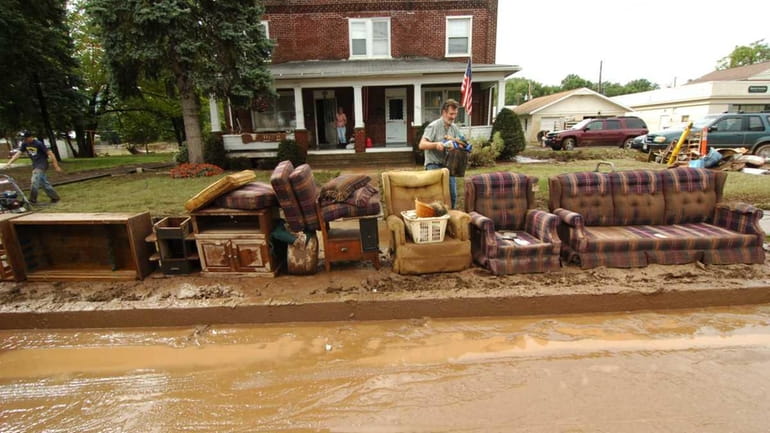Wheary: An America becoming more desperate

Michael Grafius of Williamsport carries another load of trash to the curb while helping clean up a flooded home in Montoursville, Pa., on Friday, Sept. 9, 2011. Credit: AP Photo/Mark Nance
Jennifer Wheary is a senior fellow at Demos, a public policy organization in Manhattan.
Staring at news photos of flooding and other storm-related damage that have plagued the country recently, I cannot believe my eyes. It's not so much that the vivid display of nature's brute force is incomprehensible. It's that these are familiar places.
One photo published last week in The News-Item, a central Pennsylvania paper, shows a small row house with water raging over its porch and emergency personnel evacuating residents in the middle of the night. The photo is from Shamokin, Pa., the town where I grew up. The house in the picture is my aunt's home.
Pictures of home always invoke memories. In this case, one of the things I am reminded of is that for working- and middle-class communities already hard hit by economic insecurity, when it rains it pours.
Families in Shamokin are very similar to those in upstate New York and elsewhere that have suffered from storms in the last few weeks. Long before the waters rose, many of these communities had seen better days.
Local economies once thrived. In many families, only one parent needed to work. You could expect to own a small business or hold a manufacturing job and be able to support your kids, afford a modest home, have health insurance, save for retirement and generally get by.
But after decades of disappearing jobs, declining wages and increasing expenses, this is no longer the case. As a result, people across New York, New Jersey, Pennsylvania, Massachusetts, Vermont, Maryland, the Carolinas, Texas and elsewhere lack the savings needed to weather these unexpected economic shocks. Well before the spate of recent bad weather, or the recent recession, millions of middle- and working-class families were already under water.
According to the Demos report "The Downslide Before the Downturn," five years ago, three-quarters of middle-class families lacked sufficient financial assets to cover even a subset of their essential expenses for a few months if they lost their income or hit a bump in the road.
And the last five years have been bumpy indeed. With no equity in their homes, no savings to speak of, and no adequate safety net in place, many families have turned to credit cards to pay for essentials. More than 40 percent have used credit cards to buy necessities like groceries or gas -- putting off payments and inflating them with astronomical interest rates. Already in a hole financially, these families have dug themselves deeper just so they can survive.
When you are barely getting by, and it's already a hard choice between putting food on the table and gas in your car, every unexpected expense -- from a kid's growth spurt and need for new shoes to having to repair your roof -- is a stressful event.
This is exactly what millions of working- and middle-class families have been dealing with. The wild weather since late August has only added to the pressure.
Last week, my dad was talking to a Shamokin woman he's known for 30 years. He'd never once seen her cry -- until now. The basement of the home she shares with her husband and two young daughters was flooded. Her washer, dryer, water heater and oil burner are ruined. So is a whole host of winter clothes she had in storage and countless smaller items she's still trying to sort out. Even if she has insurance, her out-of-pocket costs will be substantial. She, like many others who have been affected by storms Irene and Lee, is asking herself, "What do I do now?"
My grandfather, another lifelong Shamokin resident, used to say: "Be kind and help others, because everyone you meet is fighting a difficult battle." Beyond individual action, we can demand collectively that elected officials and those vying for public office put aside petty politics in favor of solving the problems that prevent the majority of average Americans from being able to save for a rainy day. Passing legislation to get more people working at good jobs is a start, as are making higher education affordable, designing new asset-building accounts and protecting retirement security.
For everyone affected by Irene and Lee, rebuilding is going to be tough. But for the large number of families who were already living on the edge financially, the day-to-day struggle has become monumental.
